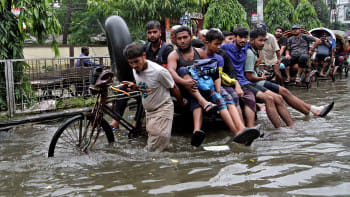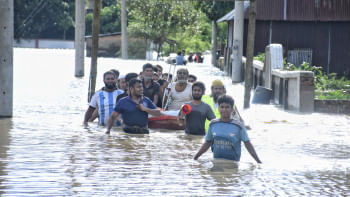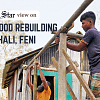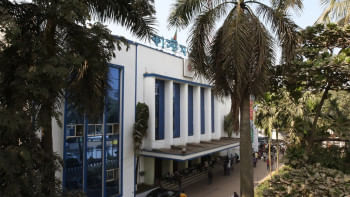The unseen toll of floods in Bangladesh

Flooding is a recurrent challenge in Bangladesh, particularly in certain districts where it's almost an annual event. However, the recent floods in the southwest region of the country were unprecedented in many ways. The sudden onset, scale, and intensity of these floods have left a significant impact on people across all sections of society. According to UN data, over 5.8 million people have been affected, with more than 50 lives lost. Millions have seen their crops destroyed and livelihoods washed away.
I had the opportunity to visit Fenni to see the devastating situation and to be with the affected communities. I also observed our humanitarian efforts, engaged with the affected communities, and supported our emergency response on the ground with the team. The journey from Dhaka to this remote area was emotionally charged and an extraordinary experience that led me to reflect on the many dimensions of humanitarian response.
Our day began early, driving through a landscape marked by the vibrant graffiti that adorns the walls of Bangladesh's public spaces. As we reached the highway, we saw numerous trucks filled with relief materials and volunteers heading toward the flood-affected areas. This scene took me back to my days as a student volunteer during the 1993 Maharashtra earthquake relief efforts. I could deeply resonate with the sense of solidarity and purpose that drives these volunteers.
Upon entering Fenni district, the devastation caused by the flash floods was immediately apparent. Watermarks on the walls showed just how high the floodwaters had risen. Fields, now resembling muddy lakes, stood waterlogged, while people scrambled to save their precious belongings. Children and young people chased after relief trucks, hoping to secure food and clean water. Nearby, garages were filled with damaged vehicles—autos and cycle rickshaws—many abandoned, likely because their owners couldn't afford repairs.
I spoke with many affected people on the ground. Abdul Karim is one of them in Feni district. He shared, "The water is overwhelming this time," recounting how he sought shelter on the roof as the water surged. His small vegetable shop, his only income source, is gone, and now he needs to start from scratch.
A rapid assessment by Oxfam in Bangladesh revealed the devastating impact of the floods in Feni and Noakhali, the hard-hit districts, with 95 percent of the population severely affected. Nearly all shelters are submerged, 48 percent destroyed, and 100 percent of water and sanitation facilities are unusable. As floodwaters recede, food insecurity worsens, with 72 percent of families struggling to eat adequately. Open defecation due to destroyed facilities is heightening the risk of waterborne diseases. Immediate needs include safe drinking water, cash support, food, and hygiene kits. Long-term recovery requires rebuilding resilient WASH facilities and homes and promoting sustainable livelihoods.
In one village, where our team was distributing relief, the water still stood two to three feet deep, and in some areas, it was over six feet. Our team used a small inflatable boat to reach people's homes. The devastation inside these homes was heartbreaking—people had lost almost everything, and many couldn't even save their livestock. The sight of animal carcasses scattered about added to the overwhelming sense of loss. Yet, in the midst of this despair, I also witnessed the incredible strength of community spirit.
I was particularly struck by the self-organised efforts of students. These young people managed traffic, tracked relief supplies to ensure they reached the most in need, and supported distribution efforts—all without regard for their own safety. Their dedication was truly inspiring. I hope local, national, and international organisations can harness this spirit of genuine volunteerism and learn from this powerful younger generation, evolving as their allies in times of need.
One aspect of the field visit that caught my attention was the branding of relief efforts organised through international agencies or supported by international donors. The obsession with branding, a byproduct of the modern humanitarian ecosystem, is troubling. While accountability is necessary, how it's often presented through branding can feel excessive, even inappropriate.
This reflection brings to mind the book, Everyone Loves a Good Drought, by P Sainath. We must resist the temptation to treat catastrophes as opportunities to inflate our portfolios and budgets. Instead, we should focus on genuinely serving our people. In times like these, our actions must be driven by compassion and aligned with the needs of those affected—not dictated by donor expectations. The first thing people need in such disasters is hope—assurance that they are not alone in this fight.
These disasters are not photo opportunities. The students of Bangladesh have shown us the power of silent, effective work. They mobilised resources, organised logistics, and ensured distribution—without branding, marketing, or conditions.
Lastly, these floods should also prompt us to reflect on their underlying causes. Social media and mainstream media have been abuzz with discussions, but let's consider the broader context. In the past four months, Bangladesh has faced three major events: floods in the north, Cyclone Remal in the south, and now these floods in the southwest. These events are stark reminders that we are in a climate emergency. We must recognise that such disasters will only increase in frequency and severity unless we develop comprehensive response and preparedness strategies.
Despite having the world's largest population of internally displaced people due to climate emergencies—our climate refugees—we still lack a dedicated, authentic way of assessing the impact of these disasters. The environmental cost, the opportunity cost, the loss of land and livelihoods, and the forced migration must all be accounted for. Bangladesh must demand rightful compensation from the polluting nations. It's time to stop treating our country merely as a recipient of charity or relief or even as a market for green energy technologies. We need to awaken a collective consciousness of our climate vulnerability and ensure concrete commitments are made in the interest of the Bangladeshi people.
Ashish Damle is country director of Oxfam in Bangladesh.
Views expressed in this article are the author's own.
Follow The Daily Star Opinion on Facebook for the latest opinions, commentaries and analyses by experts and professionals. To contribute your article or letter to The Daily Star Opinion, see our guidelines for submission.

 For all latest news, follow The Daily Star's Google News channel.
For all latest news, follow The Daily Star's Google News channel. 







Comments